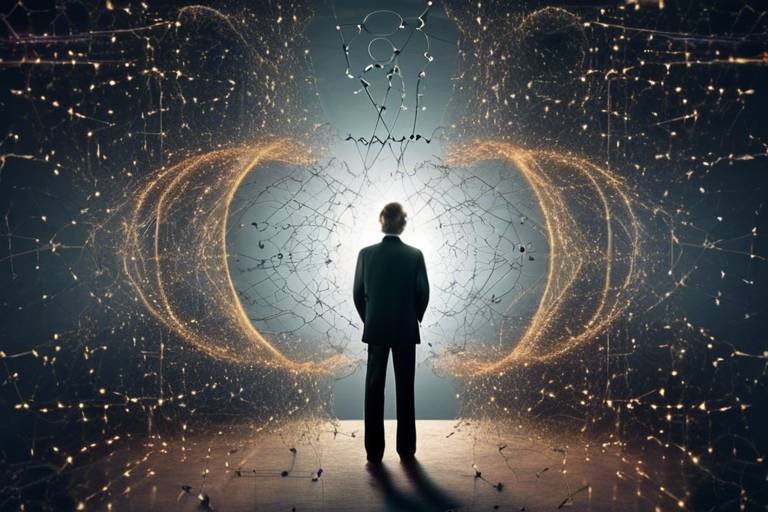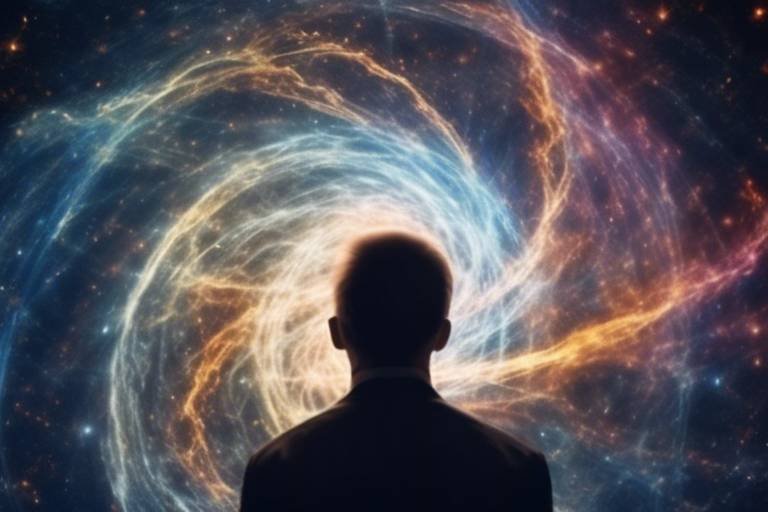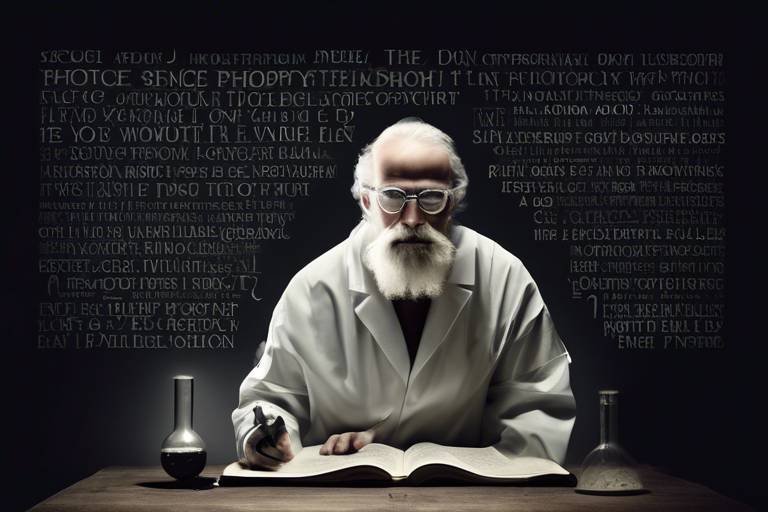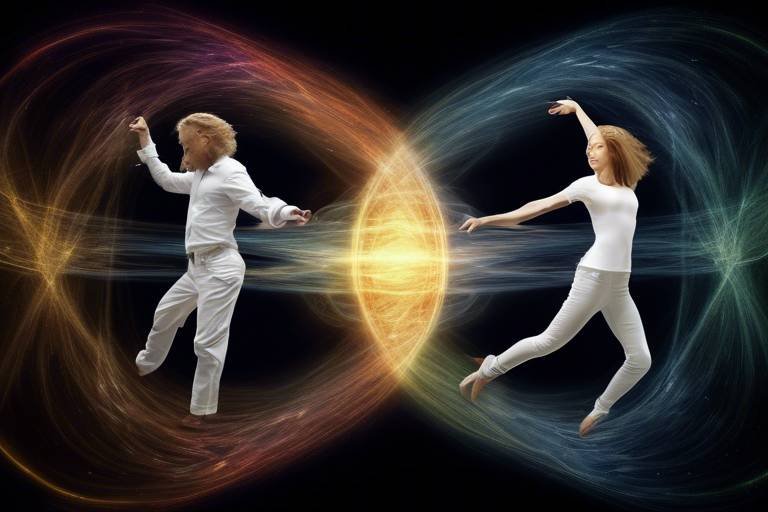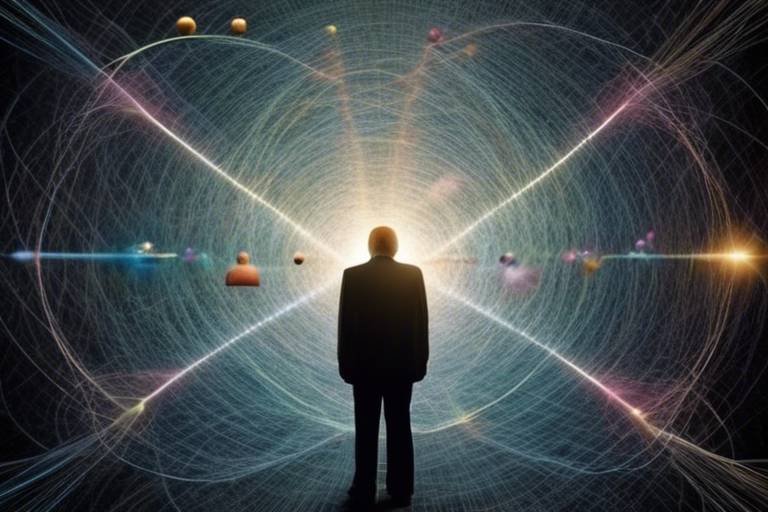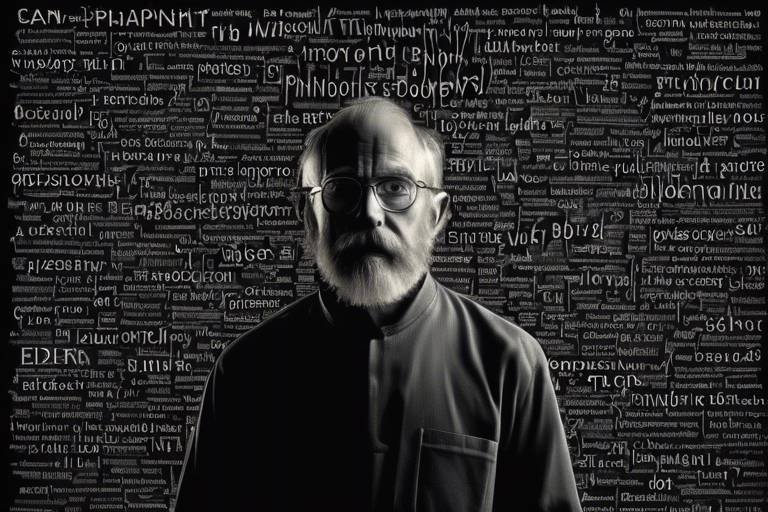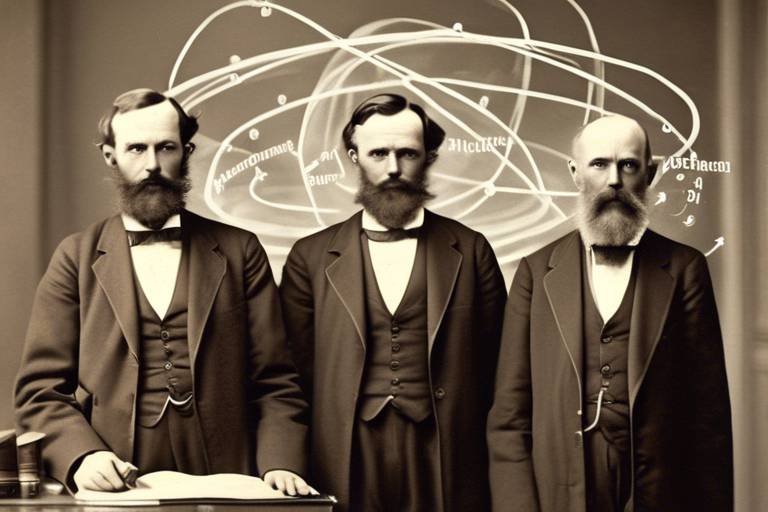How the Philosophy of Quantum Mechanics Shapes Reality
Have you ever wondered how the universe operates at its most fundamental level? The world of quantum mechanics offers a mesmerizing glimpse into the **intricate dance of particles** that defies our everyday understanding of reality. This article dives deep into the philosophical implications of quantum mechanics, revealing how these scientific principles not only challenge our perceptions but also reshape our understanding of existence itself.
At its core, quantum mechanics operates on principles that seem almost magical. Imagine a world where particles can exist in multiple states at once, where the very act of observation alters the outcome of events. This bizarre reality is not just a figment of scientific imagination; it invites us to rethink our philosophical frameworks. The implications are profound, suggesting that our understanding of **reality** is far more complex than we ever thought possible.
As we explore this fascinating intersection between quantum mechanics and philosophy, we will uncover the **nature of reality**, the role of consciousness, and the paradoxes that challenge our traditional views. Each of these elements serves as a crucial piece of the puzzle, helping us to understand not just the universe, but our place within it.
In the following sections, we will look at how quantum mechanics invites questions about determinism, the interconnectedness of all things, and the various interpretations that have emerged over time. By examining these ideas, we aim to bridge the gap between science and philosophy, fostering a dialogue that enriches our understanding of existence and reality.
Quantum mechanics challenges traditional notions of reality, suggesting that particles can exist in multiple states simultaneously. This concept of **superposition** leads to profound philosophical implications about the nature of existence and observation. For instance, when we think about a particle being in two places at once, it forces us to ask: What does it mean to exist? Is existence tied to observation, or does it persist independently of our perception?
These questions highlight a fundamental shift in how we understand reality. In classical physics, objects had definite properties and states that could be measured and observed. However, in the quantum realm, the very act of measuring a particle can alter its state. This phenomenon not only challenges our scientific understanding but also invites philosophical inquiry into the limitations of human perception and knowledge.
The observer effect raises intriguing questions about the role of consciousness in shaping reality. It prompts debates on whether observation itself alters the state of a system in quantum mechanics. Are we mere spectators in the universe, or do we play an active role in its unfolding? This question touches on the essence of consciousness and its relationship to the physical world.
Measurement in quantum mechanics not only determines the state of a system but also invites philosophical inquiry into the nature of knowledge. If our observations can change the outcome of an experiment, what does that say about the objective reality we believe to exist? This leads us to consider the limitations of human perception and the subjective nature of experience.
The tension between determinism and indeterminism in quantum mechanics invites philosophical discussions about free will, causality, and the predictability of events in the universe. Are our actions predetermined by the laws of physics, or do we have the freedom to choose? This age-old debate continues to be relevant as we explore the implications of quantum mechanics.
Quantum entanglement suggests a deep interconnectedness of particles, prompting philosophical reflections on the nature of relationships and the fabric of reality itself. Imagine two particles that are entangled, such that the state of one instantly influences the state of the other, regardless of the distance separating them. This phenomenon challenges our conventional understanding of space and time, suggesting a universe that is far more interconnected than we previously imagined.
Various interpretations of quantum mechanics, such as the Copenhagen interpretation and many-worlds theory, offer diverse philosophical perspectives on the nature of reality and existence. Each interpretation provides a unique lens through which we can examine the implications of quantum mechanics, allowing us to explore the mysteries of existence from different angles.
Quantum mechanics is rife with paradoxes that challenge our understanding of reality. One of the most famous examples is **Schrödinger's cat**, which illustrates the complexities of superposition and observation. In this thought experiment, a cat is simultaneously alive and dead until observed, forcing us to confront the bizarre nature of reality at the quantum level.
Philosophers have developed various responses to quantum paradoxes, exploring how these challenges can reshape our understanding of knowledge, existence, and the universe. These discussions encourage us to think critically about the implications of quantum mechanics and how they relate to our everyday experiences.
The interplay between quantum mechanics and philosophical inquiry encourages a dialogue between these fields, fostering a deeper understanding of reality and the fundamental questions of existence. By embracing this dialogue, we can enrich our comprehension of the universe and our place within it.
- What is quantum mechanics? Quantum mechanics is a fundamental theory in physics that describes the behavior of matter and energy at the smallest scales, such as atoms and subatomic particles.
- How does quantum mechanics challenge traditional views of reality? It introduces concepts like superposition and entanglement, suggesting that particles can exist in multiple states and are interconnected in ways that defy classical physics.
- What is the observer effect? The observer effect refers to the phenomenon where the act of observing a quantum system can alter its state, raising questions about the role of consciousness in shaping reality.
- What are some philosophical implications of quantum mechanics? Quantum mechanics invites discussions about free will, the nature of knowledge, and the interconnectedness of all things, challenging our understanding of existence.

The Nature of Reality in Quantum Mechanics
Quantum mechanics is like a wild ride through the cosmos, shaking up our traditional notions of reality. Imagine a world where particles can exist in multiple states at once—sounds like science fiction, right? But this is precisely what quantum mechanics proposes. It challenges our understanding of existence by introducing concepts such as superposition and wave-particle duality. In classical physics, we’ve been taught that an object exists in a definite state, but in the quantum realm, things get a bit murky. Here, particles can be both here and there, alive and dead, all at the same time until we take a peek. This phenomenon forces us to reconsider what we think we know about reality.
To put it simply, quantum mechanics suggests that the universe is not just a stage where events unfold in a predictable manner. Instead, it's more like a dynamic tapestry woven from countless threads of possibilities. Each thread represents a potential state of existence, and the act of observation is what pulls a thread into the spotlight, collapsing the wave function and determining the reality we experience. This idea raises profound questions: If our observation shapes reality, what does that say about our role in the universe? Are we mere spectators, or do we have the power to influence the cosmic play?
The implications of these quantum concepts extend far beyond physics; they ripple through philosophy, psychology, and even spirituality. For instance, consider the idea of non-locality, where particles can be instantaneously connected regardless of distance. This notion hints at a deeper interconnectedness in the universe, suggesting that everything might be more intertwined than we previously thought. It’s almost poetic, isn’t it? The very fabric of reality could be interwoven with threads of connection that defy our conventional understanding of space and time.
Moreover, the philosophical implications are vast. If reality is not a fixed entity but a fluid interplay of possibilities, what does that mean for our understanding of existence itself? Are we living in a universe that is inherently uncertain, where the act of knowing is fundamentally limited? These questions spark a fire of inquiry, pushing us to explore the boundaries of human perception and knowledge. As we delve deeper into the quantum realm, we find ourselves on a quest for understanding that challenges our most basic assumptions about the nature of reality.
In conclusion, the nature of reality in quantum mechanics is a rich tapestry of uncertainty, interconnectedness, and philosophical inquiry. It invites us to ponder the very essence of existence and our place within the cosmos. As we continue to explore these profound ideas, we may find ourselves not only questioning the universe but also our own consciousness and its role in shaping the world around us.

Observer Effect and Consciousness
The concept of the observer effect in quantum mechanics is nothing short of fascinating—it suggests that the mere act of observation can fundamentally alter the state of a quantum system. Imagine you're peeking into a room filled with surprises, and as soon as you open the door, everything shifts and changes. This idea raises profound questions about the role of consciousness in shaping reality. Are we merely passive observers, or does our awareness actively participate in the unfolding of events? This dilemma invites us to ponder the extent to which our perception influences the very fabric of existence.
One might wonder, does our consciousness have the power to create reality? To explore this, let's consider how the observer effect plays out in experiments like the famous double-slit experiment. When particles, such as electrons, are not being observed, they behave like waves, creating an interference pattern that suggests they exist in multiple states at once. However, once we observe them, they collapse into a single state, behaving like particles. This transformation from wave to particle challenges our understanding of reality and suggests that observation itself is a crucial factor in determining outcomes.
This leads to intriguing philosophical debates about the nature of reality and the role of the observer. Are we, as conscious beings, co-creators of our reality, or are we simply interpreting an objective world that exists independently of our observation? Some argue that consciousness is an essential component in the quantum realm, positing that without an observer, particles would remain in a state of potentiality, never fully realized. Others contend that reality exists regardless of our awareness, likening the universe to a stage where events unfold whether or not there is an audience.
To illustrate the complexities of this issue, consider the following table that summarizes different perspectives on the observer effect:
| Perspective | Viewpoint |
|---|---|
| Idealism | Reality is fundamentally mental; consciousness shapes existence. |
| Realism | Reality exists independently of observers; consciousness does not alter it. |
| Quantum Idealism | Consciousness plays a crucial role in collapsing wave functions. |
| Materialism | Consciousness is a product of physical processes; it does not influence reality. |
These contrasting viewpoints highlight the rich tapestry of thought surrounding the observer effect and consciousness. As we delve deeper into the quantum realm, it becomes increasingly clear that our understanding of reality may be more complex and intertwined with our consciousness than we ever imagined.
Ultimately, the observer effect serves as a gateway to exploring the fundamental nature of existence. It challenges us to reconsider our place in the universe and invites us to engage in a dialogue about the interconnectedness of all things. Are we simply observers, or do we have a more active role in shaping the reality we experience? The answers may be as elusive as the particles themselves, but the quest for understanding is what makes this exploration so profoundly exciting.
- What is the observer effect in quantum mechanics? The observer effect refers to the phenomenon where the act of observing a quantum system can change its state.
- How does consciousness relate to the observer effect? There is an ongoing debate about whether consciousness plays a role in shaping reality or if it merely observes an independent universe.
- What are some interpretations of the observer effect? Interpretations range from idealism, where consciousness shapes reality, to realism, where reality exists independently of observation.

Philosophical Implications of Measurement
Measurement in quantum mechanics is not merely a technical process; it serves as a profound philosophical inquiry into the very nature of reality itself. When we measure a quantum system, we are not just observing it; we are actively participating in its existence. This raises a critical question: what does it mean to know something? In classical physics, measurement was straightforward. You could measure the position, speed, and other properties of an object without altering its state. However, in the quantum realm, the act of measurement fundamentally changes the state of the system being observed.
This idea leads us to consider the limitations of human perception. Our understanding of the universe is inherently tied to our ability to measure it. Yet, in quantum mechanics, the act of measuring can introduce uncertainty, as articulated by Heisenberg's Uncertainty Principle. This principle states that the more precisely we know one property of a particle (like its position), the less precisely we can know another property (like its momentum). This paradox forces us to confront the limits of our knowledge and the tools we use to acquire it.
Moreover, the implications of measurement extend into the realm of epistemology, the study of knowledge. If measurement alters the state of a quantum system, can we ever truly know the system as it exists independently of our observation? This leads to a fascinating philosophical dilemma: Is reality objective, or is it subjective and shaped by our observations? This question is not just academic; it has real-world implications for how we understand everything from the fundamental nature of particles to the broader universe.
To better understand these implications, consider the following table that summarizes the key philosophical questions arising from the act of measurement in quantum mechanics:
| Measurement Aspect | Philosophical Question |
|---|---|
| Observer Effect | Does the act of observation create reality? |
| Uncertainty Principle | What are the limits of human knowledge? |
| State Change | Can we know a system independent of measurement? |
| Subjectivity vs. Objectivity | Is reality shaped by our perceptions? |
In conclusion, the philosophical implications of measurement in quantum mechanics challenge our traditional views of knowledge and existence. They compel us to reconsider the roles of the observer and the observed, pushing the boundaries of what we think we know about reality. As we delve deeper into these questions, we find ourselves at the intersection of science and philosophy, where the mysteries of the universe await our exploration.
- What is the observer effect in quantum mechanics? The observer effect refers to changes that the act of observation can make on a quantum system, highlighting the relationship between the observer and the observed.
- How does the Uncertainty Principle affect our understanding of measurement? The Uncertainty Principle indicates that certain pairs of properties cannot be simultaneously known to arbitrary precision, thereby limiting our knowledge of quantum systems.
- What are the philosophical implications of quantum measurement? Quantum measurement raises questions about the nature of reality, the limits of human knowledge, and whether reality exists independently of observation.

Determinism vs. Indeterminism
The debate between determinism and indeterminism in quantum mechanics is not just a scientific discussion; it's a philosophical battleground that raises profound questions about our understanding of free will, causality, and the predictability of events in the universe. At its core, determinism posits that every event or state of affairs, including every human decision and action, is the outcome of preceding events in accordance with the laws of nature. In simpler terms, if we had complete knowledge of the universe at a given time, we could theoretically predict every future event. Imagine a giant cosmic clockwork, where every gear and cog is perfectly aligned, moving in a predetermined path.
On the flip side, indeterminism suggests that not all events are determined by preceding causes. This notion is supported by various interpretations of quantum mechanics, where certain outcomes appear to be fundamentally unpredictable. For instance, when we observe a particle, we cannot predict with certainty its position or momentum; we can only describe probabilities. Think of it like rolling a die—while we know the odds, we can't predict the exact outcome of each roll. This inherent randomness challenges the deterministic view and invites a fascinating discussion about the nature of reality itself.
Furthermore, the implications of these two perspectives extend beyond physics into our everyday lives. If determinism holds true, then our sense of free will could be an illusion; we might be mere players in a scripted play. Conversely, if indeterminism is the reality, it opens the door to the possibility of free will, allowing us to shape our own destinies. This philosophical inquiry leads to various questions:
- Are our choices genuinely our own, or are they predetermined by prior states?
- How do we reconcile our understanding of morality and responsibility if determinism is true?
- What does it mean for the concept of fate and destiny in an indeterministic universe?
In conclusion, the tension between determinism and indeterminism not only shapes our understanding of quantum mechanics but also profoundly influences our philosophical outlook on life, existence, and the nature of reality itself. As we delve deeper into these concepts, we find ourselves at the intersection of science and philosophy, where the mysteries of the universe continue to challenge and inspire us.
- What is determinism? Determinism is the philosophical belief that all events, including human actions, are determined by preceding causes and natural laws.
- What is indeterminism? Indeterminism is the idea that not all events are determined by prior states, allowing for randomness and unpredictability in the universe.
- How does quantum mechanics relate to these concepts? Quantum mechanics introduces elements of randomness and unpredictability at the subatomic level, challenging the deterministic view.
- Can free will exist in a deterministic universe? This is a contentious debate; some argue that free will is an illusion in a deterministic framework, while others believe that indeterminism allows for genuine choice.

Quantum Entanglement and Interconnectedness
Quantum entanglement is one of the most fascinating phenomena in quantum mechanics, revealing a profound interconnectedness that challenges our classical understanding of the universe. Imagine two particles, once linked, that can instantaneously affect each other's states, no matter how far apart they are. This bizarre connection raises intriguing questions about the very fabric of reality. Are we not all, in some way, entangled with one another? Just as these particles exist in a state of shared destiny, perhaps our lives are woven together in a grand tapestry of existence.
The implications of quantum entanglement extend beyond mere physics; they touch upon philosophical themes of unity and interconnectedness. When we consider entangled particles, we are prompted to reflect on the nature of relationships in our own lives. Just as particles influence each other, our actions and decisions ripple through the lives of those around us. This interconnectedness suggests that our understanding of reality is not isolated or individualistic but rather a shared experience that transcends physical boundaries.
Moreover, quantum entanglement challenges the notion of separateness. In a world where everything is interconnected, the idea of isolation becomes increasingly untenable. This has profound implications for how we view our place in the universe. Are we merely individual entities, or are we part of a larger whole? The answers to these questions may not only reshape our philosophical perspectives but also influence our ethical considerations. If we are all entangled, what responsibilities do we have towards one another?
To illustrate this concept further, consider the following table that highlights the key characteristics of quantum entanglement and its philosophical implications:
| Aspect | Quantum Entanglement | Philosophical Implication |
|---|---|---|
| Definition | Particles become correlated in such a way that the state of one instantly influences the state of another, regardless of distance. | Challenges the notion of separateness in existence, suggesting a deeper unity. |
| Distance | Entangled particles can be separated by vast distances yet remain connected. | Questions the limitations of space and time in our understanding of relationships. |
| Measurement | Measuring one particle affects the state of the other. | Implies that observation and interaction play a critical role in shaping reality. |
Ultimately, quantum entanglement serves as a powerful metaphor for the interconnectedness of all things in our universe. It encourages us to rethink our relationships, our responsibilities, and our understanding of existence itself. As we delve deeper into the mysteries of quantum mechanics, we may find that the answers to the questions we seek lie not in isolation but in the intricate web of connections that bind us together.
- What is quantum entanglement? Quantum entanglement is a phenomenon where two or more particles become interconnected in such a way that the state of one particle instantly influences the state of the other, regardless of the distance separating them.
- How does quantum entanglement challenge traditional views of reality? It suggests that separateness is an illusion and that everything in the universe is interconnected, prompting us to reconsider our understanding of relationships and existence.
- What philosophical implications arise from quantum entanglement? It raises questions about unity, responsibility, and the nature of observation, indicating that our actions can influence others in profound ways.

Interpretations of Quantum Mechanics
When it comes to quantum mechanics, the interpretations are as varied as the particles themselves. Each interpretation attempts to explain the bizarre behaviors exhibited at the quantum level, and they often lead us down fascinating philosophical rabbit holes. Imagine standing at a crossroads, with each path representing a different way to understand reality. Some interpretations suggest that reality is fundamentally probabilistic, while others argue for a more deterministic framework. The most well-known interpretations include the Copenhagen Interpretation, the Many-Worlds Theory, and de Broglie-Bohm Theory, each offering unique insights into the nature of existence.
The Copenhagen Interpretation, formulated by Niels Bohr and Werner Heisenberg in the early 20th century, posits that particles do not have definite properties until they are observed. This leads to the famous idea of superposition, where a particle can exist in multiple states at once. Think of it like a coin spinning in the air—it's both heads and tails until it lands. This interpretation raises profound questions about the role of the observer in determining reality. Are we merely passive spectators, or do our observations actively shape the universe?
On the other hand, the Many-Worlds Theory, proposed by Hugh Everett III, takes a radically different approach. Instead of collapsing into a single outcome upon observation, every possible outcome of a quantum event actually occurs, but in separate, non-communicating branches of the universe. Picture a vast tree, with each branch representing a different outcome, leading to an infinite number of parallel realities. This interpretation challenges our understanding of free will and fate—if every possibility exists, what does that mean for our choices?
Then we have the de Broglie-Bohm Theory, also known as pilot-wave theory. This interpretation introduces the concept of hidden variables that determine the behavior of particles, suggesting a deterministic universe beneath the apparent randomness of quantum mechanics. It’s like peering behind the curtain of a magic show and discovering the strings that control the illusions. This interpretation offers a more intuitive understanding of quantum phenomena, but it also raises questions about the nature of those hidden variables and whether they can ever be fully understood.
With these interpretations, we see a rich tapestry of thought that reflects our attempts to grapple with the mysteries of the universe. The philosophical implications are staggering—if reality is not a single, objective truth but a complex interplay of possibilities, what does that mean for our understanding of existence? This leads us to contemplate the very fabric of reality and our place within it.
As we delve deeper into these interpretations, it becomes clear that each offers a unique lens through which to view the quantum world. They not only challenge our scientific understanding but also invite us to reflect on the nature of knowledge, existence, and the universe itself.
- What is the Copenhagen Interpretation?
The Copenhagen Interpretation suggests that particles do not have definite properties until they are measured, leading to the concept of superposition.
- What does Many-Worlds Theory propose?
Many-Worlds Theory posits that all possible outcomes of quantum events occur in separate, parallel universes.
- What is the de Broglie-Bohm Theory?
Also known as pilot-wave theory, it introduces hidden variables that determine particle behavior, suggesting a deterministic framework.
- How do these interpretations affect our understanding of reality?
Each interpretation presents different philosophical implications about existence, knowledge, and the nature of reality itself.

The Role of Paradoxes in Understanding Reality
When we dive into the world of quantum mechanics, we quickly find ourselves surrounded by paradoxes that challenge our conventional understanding of reality. These paradoxes are not mere curiosities; they serve as gateways to deeper philosophical inquiries about existence and our perception of the universe. One of the most famous examples is Schrödinger's cat, a thought experiment that illustrates the concept of superposition. In this scenario, a cat is placed in a sealed box with a radioactive atom that may or may not decay, rendering the cat simultaneously alive and dead until observed. This bizarre situation forces us to confront the limitations of our understanding and the very nature of observation itself.
These paradoxes compel us to ask profound questions: What does it mean for something to exist? How does our observation influence reality? The implications are staggering. For instance, when we consider the observer effect, we must grapple with the idea that our very act of observing can change the state of a system. This leads to the philosophical conundrum of whether reality exists independently of our perception or if it is somehow shaped by our consciousness. It's almost as if we are players in a cosmic game, where the rules are dictated by the strange behaviors of subatomic particles.
Moreover, the role of paradoxes extends beyond mere thought experiments; they act as catalysts for scientific and philosophical dialogue. By exploring these contradictions, we can begin to bridge the gap between science and philosophy. For instance, consider the following key paradoxes in quantum mechanics:
- Schrödinger's Cat: A cat in a box that is both alive and dead until observed.
- The Double-Slit Experiment: Demonstrates how particles can behave as both waves and particles, depending on whether they are observed.
- Quantum Superposition: Particles existing in multiple states at once, challenging our understanding of existence.
These paradoxes not only challenge scientific paradigms but also invite philosophical reflection on the nature of reality. They prompt us to reconsider our definitions of knowledge and truth, pushing us to explore the limitations of human perception. As we analyze the implications of these paradoxes, we find ourselves engaged in a rich tapestry of thought that weaves together the threads of science, philosophy, and even art.
In essence, the role of paradoxes in quantum mechanics is to illuminate the complexities of reality. They remind us that our understanding is still evolving and that there is so much more to explore beyond the surface. Just as a magician reveals a trick, the paradoxes of quantum mechanics peel back the layers of our reality, urging us to question, to wonder, and to seek deeper truths. In this way, they are not just obstacles to be solved but rather opportunities for profound exploration and understanding.
- What is Schrödinger's cat? Schrödinger's cat is a thought experiment that illustrates the concept of superposition in quantum mechanics, where a cat is simultaneously alive and dead until observed.
- What is the observer effect? The observer effect refers to changes that the act of observation can make on a quantum system, suggesting that reality may depend on whether it is being observed.
- How do paradoxes influence our understanding of reality? Paradoxes challenge our conventional beliefs and prompt deeper philosophical inquiries about existence, knowledge, and the nature of reality.

Philosophical Responses to Quantum Paradoxes
Quantum mechanics is not just a realm of mathematical equations and experimental results; it is a rich tapestry that intertwines with our understanding of reality itself. The paradoxes that arise within this field, such as Schrödinger's cat and the double-slit experiment, are not merely scientific curiosities. They provoke profound philosophical questions that challenge our notions of existence, knowledge, and the nature of reality. Philosophers have responded to these paradoxes in various ways, seeking to reconcile the bizarre implications of quantum mechanics with our everyday experiences and intuitions.
One of the most significant philosophical responses is the exploration of epistemology—the study of knowledge. Quantum paradoxes compel us to reconsider what it means to know something. For instance, when we observe a quantum system, we do not merely uncover its properties; we actively participate in shaping them. This leads to the conclusion that our knowledge is inherently limited and influenced by our interactions with the world. The implications are staggering: if observation can alter reality, what does this mean for our understanding of truth? Are we merely spectators in a cosmic play, or do we have a hand in the unfolding drama?
Furthermore, the concept of superposition—where particles exist in multiple states until observed—challenges our conventional understanding of existence itself. Philosophers like David Bohm have suggested that reality may be more interconnected than we perceive, advocating for a holistic view of the universe. This perspective posits that separateness is an illusion, urging us to rethink the boundaries between self and other, observer and observed. The idea that all things are interconnected resonates with various philosophical traditions, including Eastern philosophies that emphasize unity and interdependence.
Another response to quantum paradoxes is the embrace of pluralism in interpretations of quantum mechanics. The existence of multiple interpretations—such as the Copenhagen interpretation, many-worlds theory, and pilot-wave theory—suggests that our understanding of reality may not be singular or absolute. Each interpretation provides a different lens through which to view the same phenomena, reflecting the complexity and richness of existence. This plurality invites an open-minded approach to philosophical inquiry, encouraging dialogues that bridge science and philosophy.
Moreover, the notion of indeterminism introduced by quantum mechanics raises questions about free will and causality. If events at the quantum level are fundamentally unpredictable, what does this imply for our understanding of human agency? Some philosophers argue that indeterminism opens the door for genuine free will, while others contend that it complicates our understanding of moral responsibility. The interplay between quantum mechanics and ethics is a fertile ground for philosophical exploration, as it challenges us to reconsider our notions of choice and consequence.
In conclusion, the philosophical responses to quantum paradoxes are as varied and intricate as the paradoxes themselves. They invite us to engage in a deeper exploration of knowledge, existence, and the very fabric of reality. As we navigate through these complex ideas, we find that the intersection of quantum mechanics and philosophy is not just an academic exercise; it is a profound inquiry into what it means to be human in a universe that defies our traditional understanding. The dialogue between these fields is essential for fostering a more comprehensive understanding of our reality and existence.
- What is Schrödinger's cat?
Schrödinger's cat is a thought experiment that illustrates the concept of superposition in quantum mechanics, where a cat in a sealed box can be considered both alive and dead until observed. - How does quantum mechanics relate to philosophy?
Quantum mechanics raises profound questions about reality, knowledge, and existence, prompting philosophical inquiry into these concepts. - What are the implications of the observer effect?
The observer effect suggests that the act of observation can alter the state of a quantum system, leading to debates about the nature of reality and consciousness.

Bridging Science and Philosophy
In today's rapidly evolving landscape of knowledge, the lines between science and philosophy are increasingly blurred. This intersection is not merely a crossroads but a vibrant tapestry woven from the threads of inquiry, curiosity, and the quest for understanding. When we delve into quantum mechanics, we find ourselves standing at the precipice of two worlds: the empirical rigor of science and the profound explorations of philosophical thought. It's like trying to solve a complex puzzle where each piece not only fits into the larger picture but also reshapes our understanding of the individual pieces themselves.
At the heart of this dialogue is the recognition that science seeks to explain the "how"—the mechanisms of the universe, while philosophy grapples with the "why"—the implications of these mechanisms on our existence. For instance, consider the concept of quantum entanglement. On a scientific level, it describes a phenomenon where particles become interconnected in such a way that the state of one instantly influences the state of another, regardless of distance. Philosophically, this raises questions about the nature of relationships, the interconnectedness of all things, and even the fabric of reality itself. How does this entanglement inform our understanding of community, connection, and existence?
Moreover, the methodologies employed by both disciplines—observation, hypothesis, and interpretation—often lead to divergent conclusions. Scientists may arrive at a conclusion based on measurable data, while philosophers may question the very foundation of that data. This interplay can lead to a richer understanding of both fields. For example, the debate surrounding the observer effect in quantum mechanics not only challenges scientific paradigms but also invites philosophical inquiry into the nature of perception and reality. Are we mere observers, or do we play an active role in shaping the universe around us?
In essence, bridging science and philosophy is about fostering a collaborative dialogue. This dialogue encourages us to ask deeper questions and seek answers that transcend traditional boundaries. It invites us to explore the implications of scientific discoveries on our understanding of existence, morality, and consciousness. As we navigate this complex terrain, we might find that the questions we ask are just as important as the answers we seek.
To further illustrate this relationship, consider the following table that outlines key differences and similarities between science and philosophy:
| Aspect | Science | Philosophy |
|---|---|---|
| Focus | Empirical evidence and experimentation | Conceptual analysis and reasoning |
| Methodology | Hypothesis testing and observation | Critical thinking and argumentation |
| Goals | Understanding natural phenomena | Exploring fundamental questions about existence |
| Outcome | Theories and laws | Theories and philosophical frameworks |
As we continue to explore the depths of quantum mechanics and its philosophical implications, we must remain open to the idea that both science and philosophy can enrich our understanding of reality. They are not mutually exclusive but rather complementary fields that, when combined, can lead to profound insights about our universe and our place within it. So, let’s embrace this journey of exploration, where each question leads to new paths of inquiry, and every answer opens the door to further mysteries.
- What is the relationship between quantum mechanics and philosophy?
Quantum mechanics provides empirical findings that raise philosophical questions about reality, existence, and consciousness. - How does the observer effect relate to consciousness?
The observer effect suggests that the act of observation can impact a quantum system, leading to debates on the role of consciousness in shaping reality. - Can science and philosophy coexist?
Yes, science and philosophy can coexist and complement each other, enriching our understanding of complex concepts like reality and existence.
Frequently Asked Questions
- What is the observer effect in quantum mechanics?
The observer effect refers to the phenomenon where the act of observing a quantum system can alter its state. This raises intriguing questions about the role of consciousness and whether reality is influenced by our observations. Imagine peeking into a box; just by looking, you might change what's inside!
- How does quantum mechanics challenge traditional views of reality?
Quantum mechanics suggests that particles can exist in multiple states at once, which contradicts our everyday experiences of a singular reality. This leads to profound philosophical implications about existence, making us question what we really know about the world around us.
- What are the philosophical implications of quantum measurement?
Measurement in quantum mechanics not only reveals the state of a system but also prompts us to think about the nature of knowledge itself. It makes us reconsider how we perceive reality and the limitations of our understanding, much like trying to capture a fleeting moment with a camera.
- Can you explain quantum entanglement?
Quantum entanglement is a phenomenon where particles become interconnected in such a way that the state of one instantly influences the state of another, no matter the distance between them. This challenges our conventional notions of separateness and suggests a deeper interconnectedness in the universe.
- What are some interpretations of quantum mechanics?
There are several interpretations of quantum mechanics, including the Copenhagen interpretation and the many-worlds theory. Each offers unique perspectives on reality, leading to diverse philosophical discussions about existence and the nature of the universe.
- How do quantum paradoxes affect our understanding of reality?
Quantum paradoxes, like Schrödinger's cat, illustrate the complexities of superposition and observation, challenging our traditional understanding of reality. These paradoxes invite deeper philosophical inquiry about knowledge, existence, and the nature of truth itself.
- What is the relationship between science and philosophy in the context of quantum mechanics?
The interplay between quantum mechanics and philosophical thought encourages a dialogue that deepens our understanding of reality. By bridging these fields, we can explore fundamental questions about existence and the universe in a more holistic manner.

